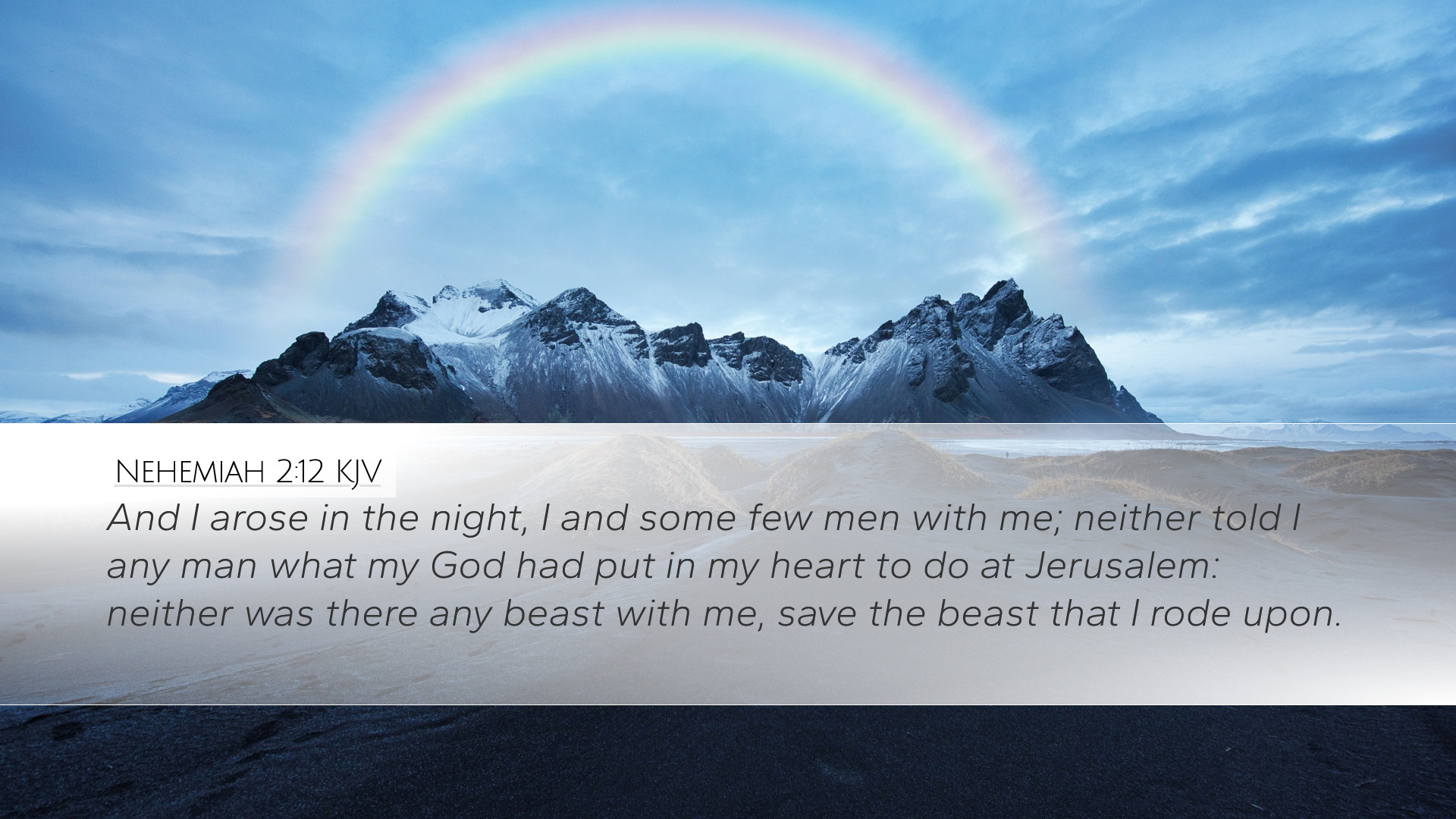Old Testament
Genesis Exodus Leviticus Numbers Deuteronomy Joshua Judges Ruth 1 Samuel 2 Samuel 1 Kings 2 Kings 1 Chronicles 2 Chronicles Ezra Nehemiah Esther Job Psalms Proverbs Ecclesiastes Song of Solomon Isaiah Jeremiah Lamentations Ezekiel Daniel Hosea Joel Amos Obadiah Jonah Micah Nahum Habakkuk Zephaniah Haggai Zechariah MalachiNehemiah 2:12
Nehemiah 2:12 KJV
And I arose in the night, I and some few men with me; neither told I any man what my God had put in my heart to do at Jerusalem: neither was there any beast with me, save the beast that I rode upon.
Nehemiah 2:12 Bible Commentary
Commentary on Nehemiah 2:12
Nehemiah 2:12 - "And I arose in the night, I and some few men with me; neither told I any man what my God had put in my heart to do at Jerusalem: neither was there any beast with me, save the beast that I rode upon."
Contextual Background
The Book of Nehemiah serves as a vital account of the Jewish restoration following the Babylonian exile. This verse appears in a critical juncture where Nehemiah, having received a burden from God to rebuild Jerusalem, quietly surveys the damage to the city's walls.
In the preceding chapters, we find Nehemiah’s fervent prayers and passionate demeanor as he seeks favor from the king and his successful journey to Jerusalem. This verse reveals his careful planning and discretion as he begins his task.
Insight from Matthew Henry
Henry emphasizes Nehemiah's wisdom in not disclosing the vision and mission given to him by God. He remarks that there are times when a leader must be discreet about God’s plans until the right moment arises for their public revelation.
Henry notes the importance of personal conviction, stating that Nehemiah acted out of a personal conviction that had been placed upon his heart by God. He went not merely with human authority, but with divine prompting, which gives credence to the authority of his mission.
Insights from Albert Barnes
Barnes reflects on Nehemiah's actions being solitary at this initial stage, stressing that he chose to take a few men with him to scout out the ruins of the city. He suggests that this symbolizes a beginning emphasis on rebuilding, not just in physical terms but spiritually.
According to Barnes, Nehemiah’s wisdom is clear in that he did not reveal his mission too early. By operating in silence, he avoids premature controversy or opposition, laying the groundwork for future support.
Thoughts from Adam Clarke
Clarke highlights the significance of the night setting, suggesting that it symbolizes a time of reflection and dedicated purpose away from distractions. Nehemiah’s nights were not wasted; they were times for contemplation and divine guidance.
Clarke also mentions the symbolism of riding a beast, indicating dignity and authority in his role, while also showcasing a readiness to undertake something significant for God. This contrasts with Jesus’ later entry into Jerusalem on a humble donkey, portraying differing aspects of authority.
Theological Reflections
This verse poignantly illustrates the often overlooked notion of divine human cooperation. God places burdens upon our hearts to incite action, but implementation must sometimes be quiet and thoroughly planned. Nehemiah demonstrates that prayerful preparation is crucial before embarking on God’s appointed missions.
The element of discretion in leadership is profound; not all visions should be shared immediately. This stance allows for strategic planning where God's work can be executed without hindrance.
Application for Pastors and Theologians
- Prayer and Discernment: Leaders must cultivate a spirit of prayerfulness to discern God’s voice and timing in all endeavors.
- Preparation before Action: Planning and surveying are essential before launching into ministry action. Just as Nehemiah took account of the walls, leaders should assess needs and resources.
- Guarding the Vision: Wisely guard the vision God gives until it is time to unveil it to others. Premature disclosure can lead to misunderstanding and sabotage.
Conclusion
Nehemiah 2:12 serves as a profound reminder of the blend of divine calling and human responsibility. Through the insights gleaned from these renowned commentaries, we see Nehemiah as a model for discipleship and leadership in the journey of faith. The lessons of discretion, preparation, and the necessity of personal conviction resonate with today’s church leaders and scholars as they navigate the complexities of ministry.


